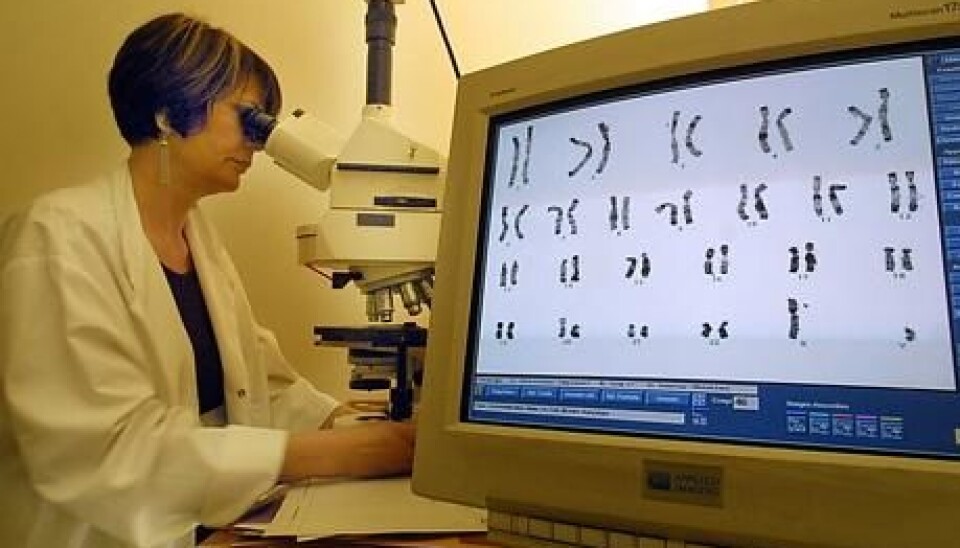
Gene worsens MS in drug treatment
Multiple sclerosis patients cannot tolerate drugs that might otherwise benefit other patients with similar diseases. Sensational new genetic research has figured out why.
A special type of drug against diseases such as psoriasis, rheumatoid arthritis and inflammatory bowel disease doesn’t help patients with multiple sclerosis.
All these diseases are related, since they are all autoimmune, i.e. the immune system attacks its own body. Drugs that fight autoimmune disease do so by blocking a key immune system signalling chemical, known as TNF.
Unlike with these other autoimmune diseases, patients with multiple sclerosis (MS) do not benefit from the treatment – they just get sicker.
This has been a cause for worry to scientists and doctors for years.
When MS patients take drugs that further block the TNF, the drug enhances the effect of the genetic variant, which makes the disease even worse. This solves the riddle of why sclerosis patients get worse after being treated with this form of medicine.
But now an international research team, headed by Danish scientists, has identified a genetic variant associated with MS as the culprit. This variant causes the TNF-blocking drugs to provoke serious side effects in MS patients because their disease is intensified rather than improved.
Findings not limited to MS patients
The scientists behind the study hope their findings will be used more broadly in the future to determine which patients benefit from a given drug and which do not.
This applies not only to sclerosis patients but also people with other diseases where heredity plays a part.
“By mapping the entire human genome, we can find information about genetic diseases,” says Lars Fugger, a Danish professor at Oxford and Aarhus Universities, who headed the study.
We’re making very real and substantial use of genetic research and our expectations are high.
“This information can shed light on what goes wrong when a disease breaks out, and it can also help doctors to better distinguish between which types of drugs the patients will benefit from – and just as importantly, which ones will only give them side effects. We’re making very real and substantial use of genetic research and our expectations are high.”
The findings have just been published in the scientific journal Nature.
Answer found among hundreds of genetic variants
In recent years scientists have identified hundreds of genetic variants in our genome which can be linked to diseases such as MS, heart disease and diabetes.
However, most of the variants are not primarily responsible for the diseases themselves, but they contribute to the overall result. The scientists’ task has thus been to identify to role and effect of each individual genetic variant.
The authors of this new study have examined a specific gene, known as TNFRSF1A, which is associated with the risk of developing MS.
TNFRSF1A encodes a protein which in normal conditions is located in the cell’s surface. This means that the gene variant associated with sclerosis instead causes the protein to float around in the liquid outside of the cell.
“In the genetic variant in MS patients, the TNFR1 protein is shorter than usual, and as a result it lacks the ‘anchor’ required to enable it to stick to the cell surface,” explains Fugger. “It therefore swims around in the fluid outside of the cell, where it can block an important signalling molecule in the immune system.
TNFR1A picks up signalling molecules
When TNFR1A is floating around in the liquid outside the cell, it picks up the TNF signalling molecule, which plays an important role in a series of processes in our bodies. But the signal never makes it further into the cell because the protein is no longer connected to the cell surface.
This is practically the same process as when a patient receives medication for autoimmune diseases: the drug goes in and blocks the TNF.
”The genetic variation that makes TNFR1A float around in the liquid outside the cell is associated with a moderate risk of developing MS,” says the professor.
“When MS patients take drugs that further block the TNF, the drug enhances the effect of the genetic variant, which makes the disease even worse. This solves the riddle of why sclerosis patients get worse after being treated with this form of medicine.”
Paves the way for future treatment
The new findings make it possible for doctors in the future to better understand why some drugs only cause side effects in some patients.
Had scientists known this when they tested TNF-blocking drugs on sclerosis patients in clinical trials, they would have been able to predict the unexpected results of their experiments.
“There is currently a poor understanding of the relationship between genetic variants and how well or how badly drugs work,” says Fugger. “Our research shows the way to a better understanding of this link. This type of research will be helpful in determining which patients should be given which type of medication.
-------------------------------
Read this article in Danish at videnskab.dk
Translated by: Dann Vinther





